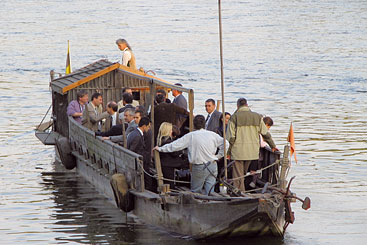
Balancing the interests of inland navigation and environmental protection
A new guidance document summarises findings about Danube ecology and provides guidance on how countries should prepare and implement new waterway projects.

The question of how to combine future waterway transport with river ecology was presented interactively with an experience on a reconstructed historic ship in the Austrian national park Danube floodplains.
On December 2007, the ICPDR’s ordinary Meeting endorsed a guidance paper on future Danube navigation that is seen as a major step forward on this disputed issue. This success is strongly linked to a similar adoption of this key document by two other relevant organisations, the Danube commission on Navigation in budapest and the International commission for the sava River basin in Zagreb.
The ‘Joint Statement on Guiding Principles for the Development of Inland Navigation and Environmental Protection in the Danube River Basin’ was created following a seven-month process, involving 50 stakeholders (including 12 basin governments and 22 industry and environmental interest groups), and three expert workshops in 2007 (in April in Orth, Austria, in June in Calarasi and Bucharest, Romania, and in October in Zagreb, Croatia).
Preventing new development conflicts. The idea of this interdisciplinary process came from the growing concern that the implementation of many waterway construction projects planned and under way along the Danube and its tributaries may lead to conflicts with the EU Water Framework Directive (such as the deterioration of water bodies). When the ICPDR Secretariat discussed this in 2006 with the European Conference of Transport Ministries (now InternationalTransport Forum) in Paris and the European Commission, it was found that only a joint dialogue of experts and interest groups can lead to a solution.
Starting the dialogue. The ICPDR Secretariat therefore worked out a concept for a process that also involved two other relevant organisations, the Danube Commission and the Sava Commission. The process brought together experts from the navigation and ecology sector as well as transport and environment ministries from Danube Basin countries. In the first two workshops, expert presentations and two field visits at the upper and the lower Danube stimulated dynamic discussions. The second step was the joint drafting of the statement that summarised the agreed findings about inland waterway transport and pressures on Danube ecology, and provided guidance on how to prepare and implement new waterway projects.
accepting other views. Through
the expert discussions, many
participants gained more insights
and understanding about the
functioning of ecology and navigation.
“This dialogue had some
educational aspects and reduced
various misunderstandings”, says
Philip Weller, Executive Secretary
of the ICPDR, “but the actual
success was the good involvement
of the diverse interest groups and
their joint formulation work on
this guidance paper.”
For Milovan Bozinovic, President
of the Danube Commission, “this
process had inspiring discussions
and the Joint Statement is a good
synthesis of our ideas. We have
also agreed upon concrete follow-up steps for the next
years.”
The full statement with all annexes can be downloaded from www.icpdr.org
Disclaimer
The information contained in the ICPDR website is intended to enhance public access to information about the ICPDR and the Danube River. The information is correct to the best of the knowledge of the ICPDR Secretariat. If errors are brought to our attention we will try to correct them.
The ICPDR, expert group members, nor other parties involved in preparation of information contained on this website cannot, however, be held responsible for the correctness and validity of the data and information provided, nor accept responsibility or liability for damages or losses arising directly or indirectly from the use of the information conveyed therein.
Only those documents clearly marked ICPDR documents reflect the position of the ICPDR.
Any links to other websites are provided for your convenience only. The ICPDR does not accept any responsibility for the accuracy, availability, or appropriateness to the user's purposes, of any information or services on any other website.
When using the information and material provided on this website, credit should be given to the ICPDR.
